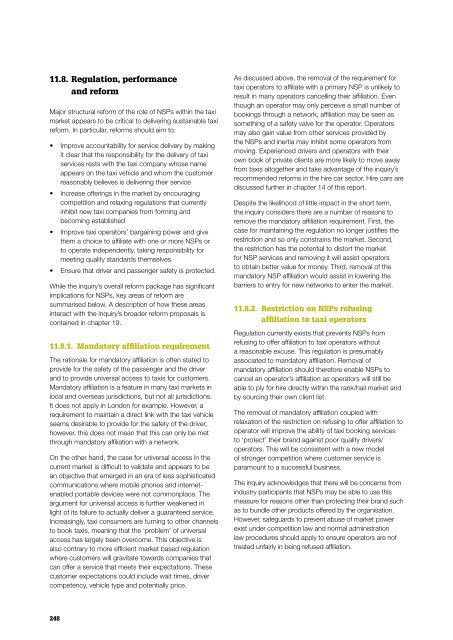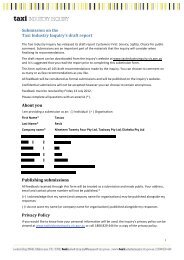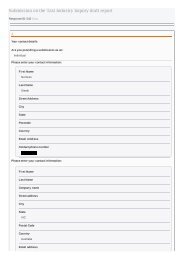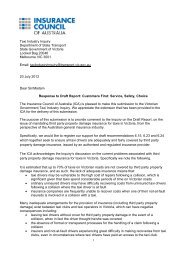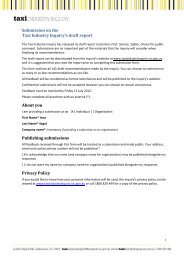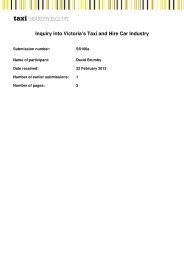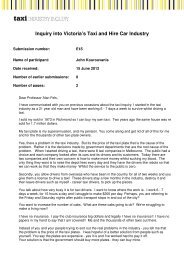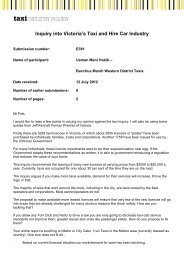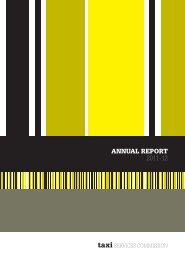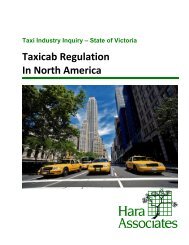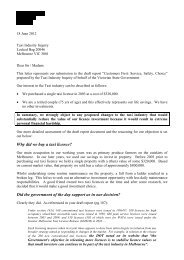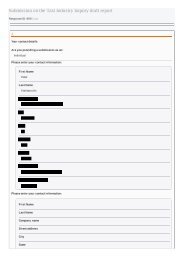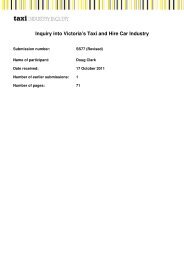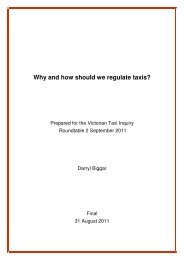Part D â Understanding and improving industry performance (PDF ...
Part D â Understanding and improving industry performance (PDF ...
Part D â Understanding and improving industry performance (PDF ...
Create successful ePaper yourself
Turn your PDF publications into a flip-book with our unique Google optimized e-Paper software.
11.8. Regulation, <strong>performance</strong><br />
<strong>and</strong> reform<br />
Major structural reform of the role of NSPs within the taxi<br />
market appears to be critical to delivering sustainable taxi<br />
reform. In particular, reforms should aim to:<br />
• Improve accountability for service delivery by making<br />
it clear that the responsibility for the delivery of taxi<br />
services rests with the taxi company whose name<br />
appears on the taxi vehicle <strong>and</strong> whom the customer<br />
reasonably believes is delivering their service<br />
• Increase offerings in the market by encouraging<br />
competition <strong>and</strong> relaxing regulations that currently<br />
inhibit new taxi companies from forming <strong>and</strong><br />
becoming established<br />
• Improve taxi operators’ bargaining power <strong>and</strong> give<br />
them a choice to affiliate with one or more NSPs or<br />
to operate independently, taking responsibility for<br />
meeting quality st<strong>and</strong>ards themselves<br />
• Ensure that driver <strong>and</strong> passenger safety is protected.<br />
While the inquiry’s overall reform package has significant<br />
implications for NSPs, key areas of reform are<br />
summarised below. A description of how these areas<br />
interact with the inquiry’s broader reform proposals is<br />
contained in chapter 19.<br />
11.8.1. M<strong>and</strong>atory affiliation requirement<br />
The rationale for m<strong>and</strong>atory affiliation is often stated to<br />
provide for the safety of the passenger <strong>and</strong> the driver<br />
<strong>and</strong> to provide universal access to taxis for customers.<br />
M<strong>and</strong>atory affiliation is a feature in many taxi markets in<br />
local <strong>and</strong> overseas jurisdictions, but not all jurisdictions.<br />
It does not apply in London for example. However, a<br />
requirement to maintain a direct link with the taxi vehicle<br />
seems desirable to provide for the safety of the driver,<br />
however, this does not mean that this can only be met<br />
through m<strong>and</strong>atory affiliation with a network.<br />
On the other h<strong>and</strong>, the case for universal access in the<br />
current market is difficult to validate <strong>and</strong> appears to be<br />
an objective that emerged in an era of less sophisticated<br />
communications where mobile phones <strong>and</strong> internetenabled<br />
portable devices were not commonplace. The<br />
argument for universal access is further weakened in<br />
light of its failure to actually deliver a guaranteed service.<br />
Increasingly, taxi consumers are turning to other channels<br />
to book taxis, meaning that the ‘problem’ of universal<br />
access has largely been overcome. This objective is<br />
also contrary to more efficient market based regulation<br />
where customers will gravitate towards companies that<br />
can offer a service that meets their expectations. These<br />
customer expectations could include wait times, driver<br />
competency, vehicle type <strong>and</strong> potentially price.<br />
As discussed above, the removal of the requirement for<br />
taxi operators to affiliate with a primary NSP is unlikely to<br />
result in many operators cancelling their affiliation. Even<br />
though an operator may only perceive a small number of<br />
bookings through a network, affiliation may be seen as<br />
something of a safety valve for the operator. Operators<br />
may also gain value from other services provided by<br />
the NSPs <strong>and</strong> inertia may inhibit some operators from<br />
moving. Experienced drivers <strong>and</strong> operators with their<br />
own book of private clients are more likely to move away<br />
from taxis altogether <strong>and</strong> take advantage of the inquiry’s<br />
recommended reforms in the hire car sector. Hire cars are<br />
discussed further in chapter 14 of this report.<br />
Despite the likelihood of little impact in the short term,<br />
the inquiry considers there are a number of reasons to<br />
remove the m<strong>and</strong>atory affiliation requirement. First, the<br />
case for maintaining the regulation no longer justifies the<br />
restriction <strong>and</strong> so only constrains the market. Second,<br />
the restriction has the potential to distort the market<br />
for NSP services <strong>and</strong> removing it will assist operators<br />
to obtain better value for money. Third, removal of the<br />
m<strong>and</strong>atory NSP affiliation would assist in lowering the<br />
barriers to entry for new networks to enter the market.<br />
11.8.2. Restriction on NSPs refusing<br />
affiliation to taxi operators<br />
Regulation currently exists that prevents NSPs from<br />
refusing to offer affiliation to taxi operators without<br />
a reasonable excuse. This regulation is presumably<br />
associated to m<strong>and</strong>atory affiliation. Removal of<br />
m<strong>and</strong>atory affiliation should therefore enable NSPs to<br />
cancel an operator’s affiliation as operators will still be<br />
able to ply for hire directly within the rank/hail market <strong>and</strong><br />
by sourcing their own client list.<br />
The removal of m<strong>and</strong>atory affiliation coupled with<br />
relaxation of the restriction on refusing to offer affiliation to<br />
operator will improve the ability of taxi booking services<br />
to ‘protect’ their br<strong>and</strong> against poor quality drivers/<br />
operators. This will be consistent with a new model<br />
of stronger competition where customer service is<br />
paramount to a successful business.<br />
The inquiry acknowledges that there will be concerns from<br />
<strong>industry</strong> participants that NSPs may be able to use this<br />
measure for reasons other than protecting their br<strong>and</strong> such<br />
as to bundle other products offered by the organisation.<br />
However, safeguards to prevent abuse of market power<br />
exist under competition law <strong>and</strong> normal administration<br />
law procedures should apply to ensure operators are not<br />
treated unfairly in being refused affiliation.<br />
248


